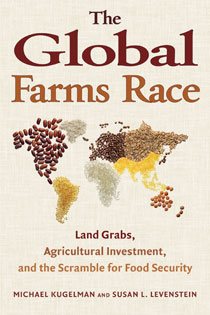"The Global Farms Race is a collection of essays by leading food security specialists, civil servants, and political scientists that provides analysis of the looming food crisis and illuminates possible ways forward."
Christian Science Monitor
"Secure access to land is key to the food security of millions of small family farms and their efforts to increase their productivity. In recent years, that access has been threatened by large-scale acquisitions of developing country farmland often by foreign investors that have rightly raised international concern. However, hard information is still limited. The Global Farms Race provides an international survey of this phenomenon and a valuable exploration of the controversies surrounding it."
Jose Graziano da Silva, Director General, United Nations Food and Agriculture Organization
"The Global Farms Race is an exceptional book, easily the best on land grabs of any that I have seen."
Lester Brown, President, Earth Policy Institute
"The Global Farms Race marks an important turning point in the current discussions of global agricultural land investments and acquisitions. The volume presents a range of balanced perspectives on the issue, and the authors take a thoughtful approach to the historical context in which these deals are taking place, the measurable social and environmental impacts of land acquisitions, and the roles of investors and governments in improving the future outcomes of global agricultural land investments."
Rosamond Naylor, Professor and William Wrigley Senior Fellow, Freeman-Spogli Institute
"A timely, carefully researched survey of one of the most important new developments in the global food economy. Essential reading for anyone interested in the increasingly complex future of food security."
Paul Roberts, author of "The End of Food"
"Editors Kugelman and Levenstein have compiled a collection that describes how governments and private firms in more developed countries are acquiring farmland in less developed countries, especially in Africa, to garner natural resources and provide a secure food source for their populations. The book contains 12 chapters, each written by a different author and offering a unique viewpoint and perspectives on the issue."
Choice
"set(s) out a helpful agenda and adopts an open-minded and empirically oriented approach."
Springer Science + Business Media
"...set[s] out a helpful agenda and adopts an open-minded and empirically oriented approach."
Food Security

